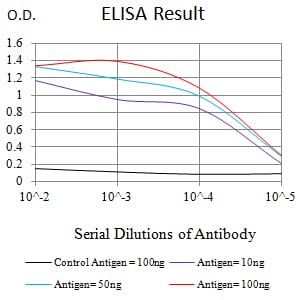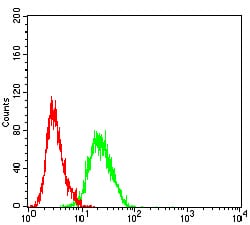

| WB | 咨询技术 | Human,Mouse,Rat |
| IF | 咨询技术 | Human,Mouse,Rat |
| IHC | 咨询技术 | Human,Mouse,Rat |
| ICC | 技术咨询 | Human,Mouse,Rat |
| FCM | 咨询技术 | Human,Mouse,Rat |
| Elisa | 1/5000-1/10000 | Human,Mouse,Rat |
| Aliases | PRNP; CJD; GSS; PrP; ASCR; KURU; PRIP; PrPc; AltPrP; p27-30; PrP27-30; PrP33-35C |
| Entrez GeneID | 5621 |
| clone | 3G10G9 |
| WB Predicted band size | 27.7kDa |
| Host/Isotype | Mouse IgG1 |
| Antibody Type | Primary antibody |
| Storage | Store at 4°C short term. Aliquot and store at -20°C long term. Avoid freeze/thaw cycles. |
| Species Reactivity | Human |
| Immunogen | Purified recombinant fragment of human CD230 (AA: 23-230) expressed in E. Coli. |
| Formulation | Purified antibody in PBS with 0.05% sodium azide |
+ +
以下是关于HCRTR2抗体的3-4篇参考文献示例(注:文献为示例性质,具体内容需根据实际研究调整):
---
1. **"Selective loss of hypocretin receptor 2 (HCRTR2) in human narcolepsy"**
*Thannickal, T.C., et al.*
摘要:通过免疫组化结合HCRTR2特异性抗体,发现嗜睡症患者下丘脑神经元中HCRTR2表达显著减少,提示受体缺失可能与疾病发病机制相关。
2. **"Characterization of a polyclonal antibody against the hypocretin receptor 2 (HCRTR2) for neuroanatomical localization"**
*Marcus, J.N., et al.*
摘要:研究报道了一种针对HCRTR2的多克隆抗体的开发与验证,通过免疫荧光和Western blot证实其在啮齿类和非人灵长类脑组织中的特异性标记,用于神经元受体分布研究。
3. **"HCRTR2 antibody reveals distinct expression patterns in the rat hypothalamus and brainstem"**
*Peyron, C., et al.*
摘要:利用HCRTR2抗体进行脑切片染色,揭示了该受体在大鼠下丘脑和脑干中的区域特异性表达,为理解其在睡眠-觉醒调节中的作用提供解剖学依据。
4. **"HCRTR2 gene mutations and receptor antibody validation in animal models of narcolepsy"**
*Chemelli, R.M., et al.*
摘要:通过HCRTR2抗体检测基因突变小鼠模型的受体表达,发现抗体在Western blot中可有效区分野生型与突变型,为研究受体功能缺失提供工具支持。
---
(提示:实际文献需通过PubMed/Google Scholar检索关键词如“HCRTR2 antibody”或“hypocretin receptor 2 immunohistochemistry”获取,以上为模拟内容。)
The hypocretin receptor 2 (HCRTR2), also known as orexin receptor type 2. is a G protein-coupled receptor primarily expressed in the central nervous system. It binds hypocretin (orexin) neuropeptides, which regulate arousal, sleep-wake cycles, appetite, and energy homeostasis. HCRTR2 dysfunction is linked to narcolepsy type 1 (characterized by hypocretin deficiency) and neurological disorders like epilepsy.
HCRTR2 antibodies are essential tools for studying receptor localization, expression, and function in research. These antibodies, often developed in rabbits or mice, enable techniques such as Western blotting, immunohistochemistry (IHC), and immunofluorescence (IF) to visualize HCRTR2 distribution in brain tissues or cultured cells. Specificity is validated via knockout controls or peptide-blocking assays to ensure minimal cross-reactivity with related receptors like HCRTR1.
Research applications include exploring HCRTR2's role in sleep disorders, metabolic regulation, and neurodegenerative diseases. Antibodies also aid in drug development targeting HCRTR2 for insomnia or obesity. However, challenges like tissue-specific isoform detection or post-translational modification variability require careful antibody validation. Overall, HCRTR2 antibodies remain pivotal in unraveling the receptor's pathophysiology and therapeutic potential.
×